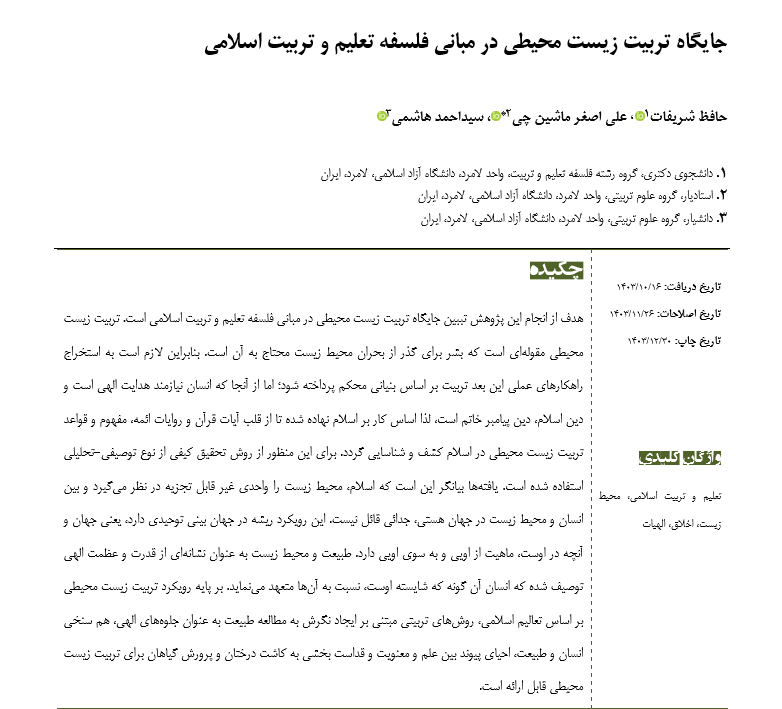The Role of Environmental Education in the Foundations of Islamic Philosophy of Education
Keywords:
Islamic education, Environment, Ethics, theologyAbstract
The aim of this research is to clarify the role of environmental education in the foundations of Islamic philosophy of education. Environmental education is a concept that humanity needs to address the environmental crisis. Therefore, it is necessary to extract practical strategies for this aspect of education based on a solid foundation. Since humans require divine guidance and Islam is the religion of the final prophet, the foundation of this work is based on Islam, with the objective of uncovering and identifying the concept and principles of environmental education in Islam through the core verses of the Quran and the sayings of the Imams. For this purpose, a qualitative research method of a descriptive-analytical nature was utilized. The findings indicate that Islam considers the environment as an inseparable unit and does not separate humans from the environment in the universe. This approach is rooted in a monotheistic worldview, meaning that the world and everything within it have their essence from and towards God. Nature and the environment are described as signs of divine power and greatness, and humans are made responsible for them in a manner befitting their worth. Based on the approach to environmental education derived from Islamic teachings, educational methods focusing on fostering an attitude towards studying nature as divine manifestations, the congruence of humans and nature, the revival of the connection between science and spirituality, and the sanctification of tree planting and plant cultivation can be presented for environmental education.
Downloads
References
Benson J. Environmental Ethics. Tehran: Environmental Protection Organization; 2018.
Hadadi M. Foundations of Environmental Ethics in Religions. Information on Government and Knowledge.
;3(3):25-8.
Jahangir I. The Environment and Its Crisis: A Quranic Approach. Cultural and Social Knowledge. 2011;2(7):63-84.
Palmer J. Environmental Education in the 21st Century. Tehran: SAMT Publications; 2019.
Moein M. Moein Dictionary. Tehran: Amir Kabir; 1971.
Komeijani D, Faryadres Z. Familiarity with the Structure of Religious Education and Strategies for Its Acceptance in
Childhood. Semi-Annual Journal of Educational Teachings in the Quran and Hadith. 2015;1(2):18-1.
Falsafi MT. Philosophical Discourse: The Child in Terms of Inheritance and Education. Tehran: Institute for the
Publication of Islamic Teachings; 1989.
Falsafi MT. Al-Hadith (Educational Narratives from the School of Ahl al-Bayt). Tehran: Islamic Culture Publishing
Office; 1989.
Delshad Tehrani M. Manzar Mehr: Foundations of Education in Nahj al-Balagha. Tehran: Darya Publications; 2000.
Morovati S, Nasrabadi A, Akbarnejad M, Hosseini Nia SMR, Rasouli A. Educational Components of the Perspective
of a Religious Society Based on the Quran and Hadith. Scientific-Research Semi-Annual Journal of Educational Teachings in
the Quran and Hadith. 2017;2(4):58-41.
Shariati S. A Study of the Term "Education" in the Quran and Tradition. Quarterly Journal of Educational Psychology.
;8(23):62-74.
Shamkhi M. The Impact of Quranic Education on the Manifestation of Human Perfection. Semi-Annual Journal of
Educational Teachings in the Quran and Hadith. 2015;1(2):76-59.
Brooke JH. Natural Theology. Letter of Science and Religion. 2003(20):39-58.
Mohaghegh Damad SM. Theology of the Environment. Religious News. 2000;6(17):7-30.
Kauklemans J. Martin Heidegger: An Introduction to His Philosophy. Tehran: Hikmat Publications; 2001.
Abbasi V. Hermeneutics and Religious Thought. Kosar-e-Ma'arif. 2010;6(13):141-74.
Drenthen M. Environmental Hermeneutics and the Meaning of Nature In - S. M. Gardiner & A. Thompson (Eds.),
The Oxford Handbook of Environmental Ethics (pp. e15-e27). Oxford: Oxford University Press; 2016.
Imani Naeini M, Talaei E, Saadi Pour M. Explaining Environmental Education Based on the Foundations of
Educational Philosophy in the Islamic Republic of Iran. Quarterly Journal of Applied Issues in Islamic Education. 2017;2(24):7-
doi: 10.29252/qaiie.2.4.7.
Nelson MP. Environmental Ethics. Ethics. 2006(2 & 3):60-74.
Abedi Sarvestani A, Shahvali M, Mohaghegh Damad SM. The Nature and Views of Environmental Ethics with
Emphasis on Islamic Perspectives. Ethics in Science and Technology. 2007;2(1 & 2):72-59.
Carlson A. Environmental Aesthetics. Aesthetic Studies. 2009;10(20):291-302.
Nozari HA. Feminism and Historiography (2): Theories and Applications. Journal of Information on Wisdom and
Knowledge. 2010;5(6):64-7.
Moshirzadeh H. From Movement to Theory: Two Centuries of Feminism. Tehran: Shirazeh Publications; 2006.
Salehi S, Lotfi B. A Sociological Analysis of Gender Differences in Environmental Attitudes in Iran. Economic
Sociology and Development. 2014;3(1):109-38.
Asghari Loghmaghani S. Fundamentals of Environmental Protection in Islam. Tehran: Islamic Culture Publishing
Office, Environmental Protection Organization; 1999.
Bidhendi M, Karbasi Zadeh A, Shiravand M. The Role of Religious Teachings in Solving Environmental Crises.
Studies on Science and Religion. 2010(2):7-23.
Fahimi A, Mashhadi A. Intrinsic and Instrumental Value in Environmental Philosophy (From Philosophical
Approaches to Legal Strategies). Philosophical-Theological Studies. 2009;11(1):291-302.
Nasr SH. The Need for Sacred Knowledge. Qom: Ta Publications; 2000.

Downloads
Published
Submitted
Revised
Accepted
Issue
Section
License
Copyright (c) 1403 Journal of Study and Innovation in Education and Development

This work is licensed under a Creative Commons Attribution-NonCommercial 4.0 International License.










